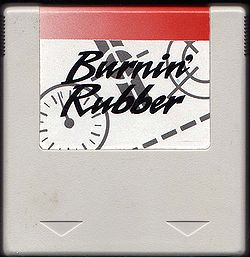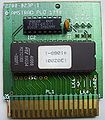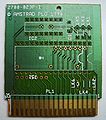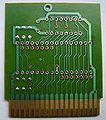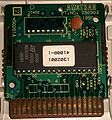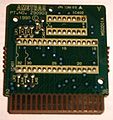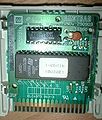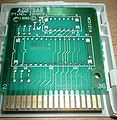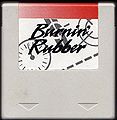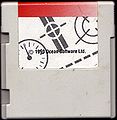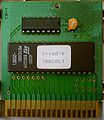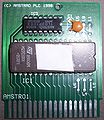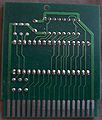Difference between revisions of "GX4000 cartridge"
(→Links) |
|||
| Line 1: | Line 1: | ||
[[Image:Burning Rubber - cara A.jpg|right|thumb|250px|A cartridge for the + series]] | [[Image:Burning Rubber - cara A.jpg|right|thumb|250px|A cartridge for the + series]] | ||
| − | A cartridge system was introduced with the launch of the | + | A cartridge system was introduced with the launch of the [[Plus]] and GX4000 series. This enabled developers to distribute games via cartridges on the new Amstrad. The cartridges are protected with the [[ACID]] chip. |
== EPROMs == | == EPROMs == | ||
| − | All known manufactured cartridges contain EPROMs (rather than PROMs or ROMs). The cartridges can be fitted with different EPROMs in range of | + | All known manufactured cartridges contain EPROMs (rather than PROMs or ROMs). The cartridges can be fitted with different EPROMs in range of 32kb through 512kb, but only 128kb to 256kb versions are known to have been produced. The cartridge PCBs typically include six [[LK Links]] to match the PCB to the EPROM pin-outs: |
VCC ---LK1--- EPROM.A18 ---LK2--- CA18 | VCC ---LK1--- EPROM.A18 ---LK2--- CA18 | ||
VCC ---LK3--- EPROM.A17 ---LK4--- CA17 | VCC ---LK3--- EPROM.A17 ---LK4--- CA17 | ||
| Line 21: | Line 21: | ||
== Protection == | == Protection == | ||
| − | The EPROMs aren't encrypted, making it very easy to dump their content, or to replace them by other EPROMs. However, all cartridges must contain an | + | The EPROMs aren't encrypted, making it very easy to dump their content, or to replace them by other EPROMs. However, all cartridges must contain an [[ACID]] chip, otherwise the [[Plus]]/GX4000 refuses to work, meaning that unlicensed third-party developers couldn't produce cartridges without buying the [[ACID]] hardware from Amstrad. |
| − | + | ||
| − | + | ||
== Pictures == | == Pictures == | ||
| Line 65: | Line 63: | ||
Amstrad released a Demonstration system for his retailer in order to show GX4000 games: the [[Amstrad CSD]] (Cartridge Software Demonstrator). | Amstrad released a Demonstration system for his retailer in order to show GX4000 games: the [[Amstrad CSD]] (Cartridge Software Demonstrator). | ||
| − | It was a | + | It was a 464 [[Plus]] motherboard, with an extra "daughter board" allowing the insertion of 12 games cartridges, plus an extra special cartridge acting as an OS. |
<gallery caption="Some photos of Amstrad Expo 90"> | <gallery caption="Some photos of Amstrad Expo 90"> | ||
Revision as of 13:06, 5 December 2010
A cartridge system was introduced with the launch of the Plus and GX4000 series. This enabled developers to distribute games via cartridges on the new Amstrad. The cartridges are protected with the ACID chip.
EPROMs
All known manufactured cartridges contain EPROMs (rather than PROMs or ROMs). The cartridges can be fitted with different EPROMs in range of 32kb through 512kb, but only 128kb to 256kb versions are known to have been produced. The cartridge PCBs typically include six LK Links to match the PCB to the EPROM pin-outs:
VCC ---LK1--- EPROM.A18 ---LK2--- CA18 VCC ---LK3--- EPROM.A17 ---LK4--- CA17 VCC ---LK5--- EPROM.A15 ---LK6--- CA15
Usually the following LKs should be installed:
(----- EPROM -----) (------------------------ Links installed -------------------------) Type Pins Size A15 A17 A18 27C256 28 32K LK5 (A15=VCC=High) LK3 (A17=VCC=Supply) N/A 27C512 28 64K LK6 (A15=A15=Address) LK3 (A17=VCC=Supply) N/A 27C1001 32 128K LK6 (A15=A15=Address) N/A LK1 (A18=VCC=/PGM) 27C2001 32 256K LK6 (A15=A15=Address) LK4 (A17=A17=Address) LK1 (A18=VCC=/PGM) 27C4001 32 512K LK6 (A15=A15=Address) LK4 (A17=A17=Address) LK2 (A18=A18=Address)
Some cartridge PCBs don't have any LKs installed, instead, the etched circuit has hardwired connections between some of them. One could scratch them off, and then use the LK soldering points to reconfigure the board for eproms of other size.
Protection
The EPROMs aren't encrypted, making it very easy to dump their content, or to replace them by other EPROMs. However, all cartridges must contain an ACID chip, otherwise the Plus/GX4000 refuses to work, meaning that unlicensed third-party developers couldn't produce cartridges without buying the ACID hardware from Amstrad.
Pictures
- 2700-023P-1 (with hardwired LK1 and LK6, and single-sided soldering points)
- PT-NO-Z90903-MS0201A (with custom LKs, and single-sided soldering points)
- PT-NO-Z90903-MC0121A (with custom LKs, and double-sided soldering points)
- Spanish cartridge without text-layer on PCB (otherwise same as 2700-023P-1)
- AMSTRO1 (with hardwired LK1 and LK6, and double-sided soldering points)
- Cartridge Slot
Demonstration System
Amstrad released a Demonstration system for his retailer in order to show GX4000 games: the Amstrad CSD (Cartridge Software Demonstrator).
It was a 464 Plus motherboard, with an extra "daughter board" allowing the insertion of 12 games cartridges, plus an extra special cartridge acting as an OS.
- Some photos of Amstrad Expo 90
Courtesy of Amstrad.cpc.free.fr
Pin-Outs
Misc
- RAM7, a French hardware developer, created a device to hack CPC Plus cartridges.
- CPC GX4000-Multi EPROM Cartridge
